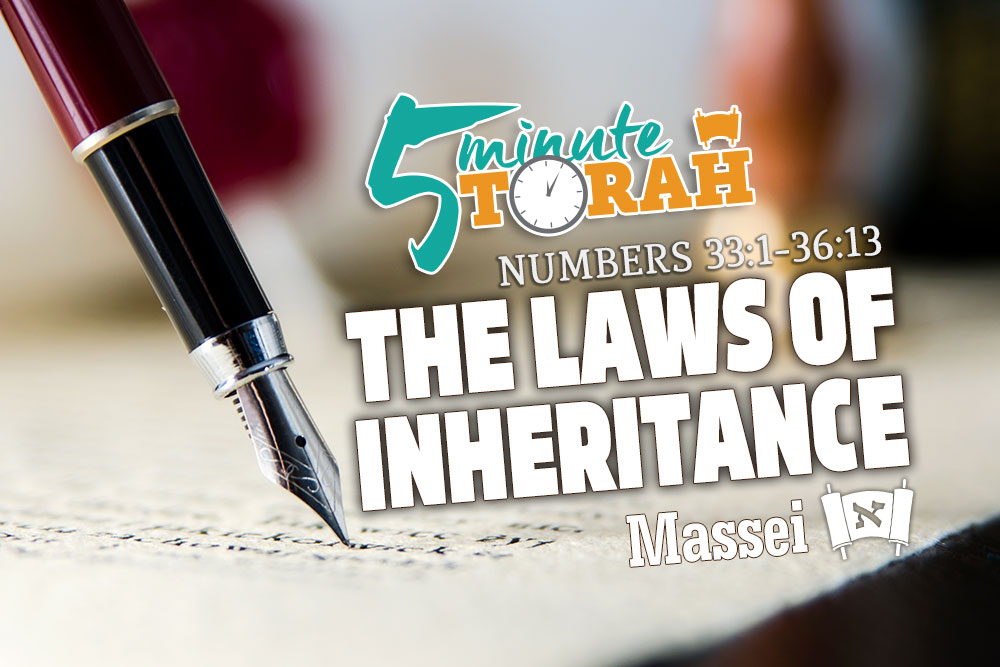The Laws of Inheritance
Series:

Parashat Massei (Numbers 33:1-36:13)
Parashat Massei is the final portion in the book of Bamidbar (Numbers). This portion begins in chapter 33 by recounting the various encampments made by the Children of Israel during their years subsequent to their exodus from Egypt. Chapter 34 defines the borders given to the Children of Israel as their inheritance, and chapter 35 outlines the cities given to the Levites. In the final chapter, Numbers 36, we learn some foundational principles regarding biblical inheritance. But before we get into this account, we need to understand a couple of inheritance issues.
First, although this matter has been under scrutiny in recent years, according to Jewish law, Jewish identity is inherited through the mother. This explains why Paul, who is very outspoken in his epistles against circumcision for Gentiles, has one of his disciples circumcised and another one remain uncircumcised. According to Galatians 2, Titus, who is clearly not Jewish (“he was a Greek,” Galatians 2:3), is not obligated to take on circumcision. Since he is Greek and does not have a Jewish mother, he is under no compulsion to be circumcised.
This is not the case, however, with his disciple Timothy. According to the account in Acts 16, Timothy is never referred to as a Greek. He was “the son of a Jewish woman” whose “father was a Greek” (vs. 1–3). This made him halachically (legally) Jewish. His father, being a Greek, probably did not want him circumcised as a child and therefore Paul urged Timothy to fulfill his obligation as an adult to take on the sign of the covenant by way of circumcision. Timothy’s Jewish identity, inherited through his mother, mandated his need for circumcision.
Second, although Jewish identify is inherited matrilineally, tribal identity is a patrilineal inheritance. For example, John the Immerser’s father, Zechariah, was a kohen (priest) in the line of Abijah (Luke 1:5). This makes John a kohen also. Paul, a Benjamite by tribal affiliation, was so because his father was also descended from Benjamin. Understanding these two laws helps explain the problem of intermarriage in Ezra 9–10, and why Ezra had the men of Israel divorce and send away their foreign wives along with their children.
Finally, our current parashah concludes with the incident involving the daughters of Zelophehad. This incident address two issues of inheritance: material inheritance of daughters and tribal affiliation of wives. In this unique case, there was a man named Zelophehad, of the tribe of Manasseh, who had five, unmarried daughters. However, he died before producing any male offspring. Since he had no male offspring, his inheritance was divided between his daughters. This produced a problem concerning inheritance, and the potential transfer of inheritance through intermarriage. Their kinsmen spoke up:
If they are married to any of the sons of the other tribes of the people of Israel, then their inheritance will be taken from the inheritance of our fathers and added to the inheritance of the tribe into which they marry. (Numbers 36:3)
Since property inheritance was passed down through the males, it remained within the tribal possession no matter how many times it was inherited. However, problems arose when a daughter inherited. To whom did ownership pass upon her marriage? As we can see, it is assumed that once a woman was married she took on the tribal identity of her husband. This would cause the property to be taken from the tribal boundaries originally assigned to it.
As one can see, this would quickly become a problem. Rather than having boundaries for the regions of Judah, Dan, Naphtali, etc. the land would be divided up into a patchwork landscape of tribal boundaries that would change from year to year. In order to remedy this potential problem, Hashem told Moses:
Every daughter who possesses an inheritance in any tribe of the people of Israel shall be wife to one of the clan of the tribe of her father … So no inheritance shall be transferred from one tribe to another. (Numbers 36:8–9)
The solution was for daughters who had inherited property to marry only within their tribe. If they did not own property, however, they were free to marry into any tribe. Only if they owned property was a restriction placed upon them in regard to whom they could marry.
Why does any of this matter? Because Israel belongs to God, and He cares for it dearly. Although most Believers are not concerned with the land given to the Children of Israel and its ownership, to Hashem—the God of Abraham, Isaac, and Jacob—it is of great concern:
The eyes of the LORD your God are always upon it, from the beginning of the year to the end of the year. (Deuteronomy 11:12)
The laws of property inheritance for the Children of Israel within the Promised Land, unfortunately are not applicable today. Why? Because Israel is not ruled over by the principles of Torah. One day, however, our Messiah King will reign from Jerusalem and the Torah will go forth from Zion and the laws of the Kingdom will be reestablished. May it be soon and in our lifetime, Amein.








